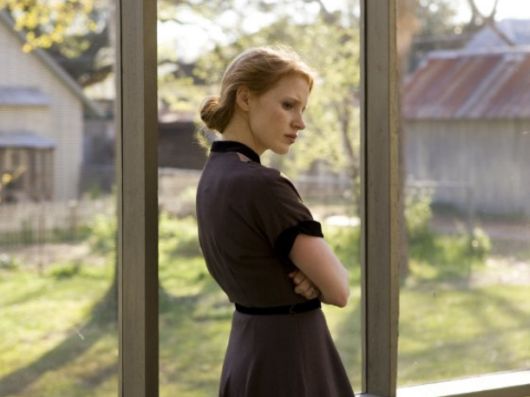
One Big, One Small
by JESSE KLEIN
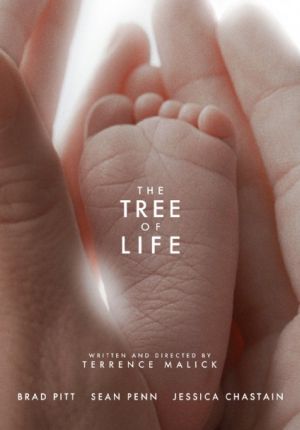
The Tree of Life
dir. Terrence Malick
138 minutes
It is impossible to watch Terrence Malick’s new film The Tree of Life without having an opinion. Some will find this year’s winner of the Palme D’Or a towering achievement, nothing short of a landmark in American filmmaking. Others will be underwhelmed, will roll their eyes at its sheer exuberance, scoff at the project's attempt to depict an American post-World War II consciousness alongside the birth and evolution of the universe in under two and a half hours.
Weeks before its national release, The Tree of Life has already been lauded, called a "prayer" by Roger Ebert and drawn comparisons to Melville’s Moby-Dick and Whitman’s Leaves of Grass from A.O. Scott. Though the film does contain images and sequences as broad in scope as can be imagined, its core lies in individual, fragmented childhood memories, likely those of Malick himself, growing up in suburban Texas in the 1950s. Memory and how the brain remembers and how it recounts to itself is the thread through The Tree of Life, and the juxtaposition of a post-war pre-adolescence with the birth of the universe is nearly oracular, and so, easy to criticize in its largesse. But The Tree of Life transcends criticism, even opinion. It just is. It does not entertain or explain; that is not the film's purpose. This does not make it better than others, or suggest it has necessarily achieved a level of greatness. Malick uses the film medium to show existence, in all its completeness, albeit from an individual perspective. And he does so through the refracted prism of memory.
The film begins and is defined by a loss, the loss, one we experience with Mrs. O’Brien, played by the relatively unknown (and soon to very well-known) Jessica Chastain. One day a man arrives with a telegram, a telegram that informs her of her son R.L.'s death at nineteen. We don’t know how or why he died, though the implication is that he perished during wartime. She calls her husband Mr. O’Brien, played by Brad Pitt, and then the two are, together and alone, stranded in never-ending grief.
The other person forever ruined by this is the eldest son. Jack is played by Sean Penn as an adult and non-actor Hunter McCracken as a boy. Jack is the film’s ballast, the lens through which we experience this world. McCracken as Young Jack is an absolute wonder, a relic of the 50s, his wide nose and mouth challenged by his all-seeing green eyes, made light of by his big ears. McCracken’s sage facial expression, intently watching but seething with pre-adolescent passions, explains everything, somehow universalizing his experience with a glance.

After news of the middle child R.L.’s death, Malick takes us back to the beginning, showing us the Big Bang in all its godly mystery. Some will find this section of the film trying; it offers no connection, no narrative pull, it is simply a visual telling of the birth of the universe. Comparisons to 2001: A Space Odyssey aside, this section astounds because of its sheer beauty. It does not mean anything, it doesn’t stand in for anything else, it just is. When later we see a CGI dinosaur spare the life of its prey, we are tempted to draw parallels with the brothers, with the Darwinian nature of late childhood and early adolescence. But perhaps this is just another moment Malick chooses to show in the world’s evolution, like the jellyfish sauntering toward the water’s surface. And this evolution, this story of births and rebirths culminates with Jack O’Brien’s entrance into the world.
Jack’s infant life is told in isolated moments and details: two pairs of feet, one big one small, dragging across green grass, the look from afar of a crib, your crib, covered in an afternoon sun. These kinds of images are past clichéd, and yet, Malick reinvents them in their utter simplicity — one of the remarkable things about The Tree of Life is that it is a film made in 2011 devoid of irony and cynicism. We see Jack grow quickly, with music soaring through it all, pushing one image over the last. Nearly the entire film has music in it, and so there are not set pieces, distinct scenes and montages, but rather, the whole film is a montage, in the sense that it is an interlude told visually with music as backdrop. But, in this case, the interlude is eternity.
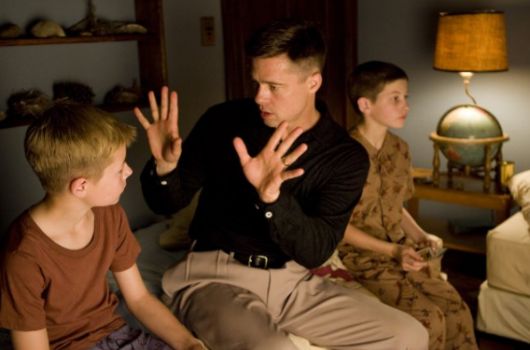
Malick slows his rhythm and settles into the O’Brien’s life, now with three boys, Jack, R.L. and the amorphous Steve, the youngest, who seems to exist if only as a witness, as proof that the other family members are really there, not merely dreams themselves. The events we see for the next ninety or so minutes belong to Jack. They are not dreams, they contain order and meaning, there is none of the randomness or hidden meanings of dreams. Rather, they are memories. Even when Jack is not present, we feel his gaze taking in the scene, experience his need for autonomy, for selfhood, and how that battles his need to be governed and loved by his parents. Indeed, the editing can feel random, overly frenetic at times, but it’s just Jack, sifting through time, remembering the tips of his mother’s arms in the sun, the length of chord between two telephone cans, the white hairs shining on his baby brother’s head, while he stands, inches away.
In a film told through the extraordinary cinematography of Emmanuel Lubezki, it is the editing that defines it. There is no coverage, no shot reverse shot, no method other than following a mind that recalls, that seeks. In that way The Tree of Life is a stream of consciousness work, a film that conjures Joyce or Woolf, rather than Whitman or Melville. The succession of images is what Jack, adult and child, is thinking, feeling. We feel his confused relationship with his father, and so we too feel conflicted about him.
Pitt as Mr. O’Brien is almost boorish, and almost brilliant. He is overbearing but does so with the best of intentions; he wants his kids to be better than he is. When, at around the midway point, Jack sees his father lying under his car fixing it in the driveway, he contemplates kicking the carjack away, crushing him instantly. There are a number of these moments in the film, where Jack realizes his own impulses, his own humanness, sees that he is capable of thinking things that are not nice about people he loves.
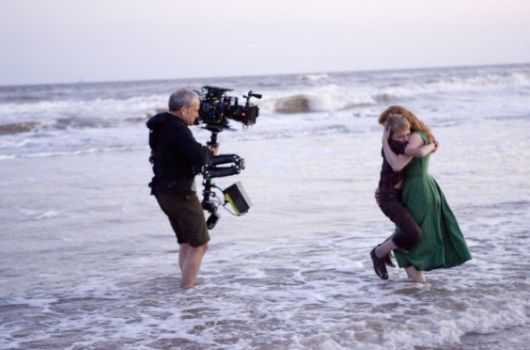
His relation with his mother is equally complex and charged. It is Jack and the Mother, and not the father, who speak in a whisper, not so much as voiceover narration, but incantations, talking to God, or R.L., or themselves. The Mother tells her sons that there are two ways through life, nature and grace. She admits the virtues of both but suggests grace as the path to follow. Indeed, Jack’s problem with his mother lies in her stoic passivity. As he grows more frustrated, he accuses her of not standing up to her husband, of not being strong enough. Chastain as Mrs. O’Brien is fleeting, almost translucent: beautiful and loving though forced into emotional absentia. These altercations with his parents confuse him and force him to rebel, from his parents’ stronghold, though mostly from himself.
In one scene, Jack stands in the living room holding a lamp toward his brother who holds a coat hanger an arm’s length away. R.L. is fair-haired, has a lightness to him, but here he stands with trepidation looking not at the open socket but into his brother’s eyes, looking for safety, affirmation. McCracken gives nothing away, not the sense of false safety, nor that of brotherly love — he wants R.L. to make this decision for himself. "I trust you." R.L. says. And slowly, really slowly, brings the hanger to the socket and with a quick thrust of his arm, puts it in. Nothing happens. It is not shown, but it probably was not plugged in at all. R.L. has a softness that Jack doesn’t have, can’t have as the eldest, the one closest to their father and his harsh affections. It is R.L. who shares his father’s passion for music, something Jack notices all too often. As the eldest, it is Jack who must experience everything first, what feels in the film like the first time ever.
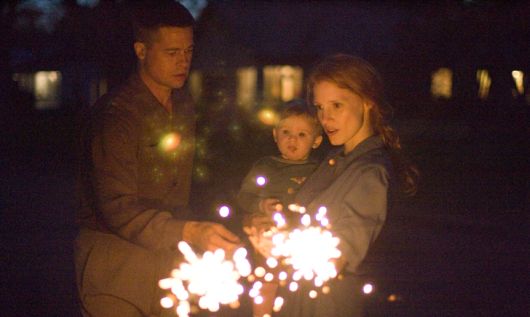
As Jack sits on the front lawn, a lawn that feels expansive in play, tortuous in work, he sees a neighbor, a beautiful unknown neighbor, come and go. One day, when he sees this neighbor leave the house he sneaks in. Though it feels like he is already lost, this all being so new, he goes straight for her bedroom, for her drawers. He looks through the jewelry, through the dresses, things that have only had meaning until now in relation to his mother. He pulls out one dress, then puts it back. Finally, he takes out a slip or nightgown and lays it on the bed. In what feels like less than a second, there is a quick shot of him standing over the dress and then suddenly he is outside, in a forest, holding the dress as if it’s evidence that must be disposed of. (The implication is of his first experience with masturbation.)
He looks around frantically, throws the dress under some plywood but then soon picks it up. He sees the flowing creek and quickly throws the dress into it. He almost immediately understands the permanence of the act: he can’t clean it and put it back, there it goes. Cowed and confused, Jack returns home to see his mother waiting, arms crossed in the summer dusk. But, now, it’s not just his mother but a woman, a woman that someone might think about the way he thought about his neighbor. Jack can do nothing but walk with head bowed into his father’s house.
Moments like these populate Jack’s struggle, his inner conflict of love and resentment toward his parents, especially his father. As an adult, we see a successful Jack, presumably an architect, in a high-rise office. But in the office we do not see him making decisions or excelling but rather wandering around aimlessly, looking at people and things as if they’re everything but what they should be, need to be, his brother. On an elevator that seems to never end, he speaks on the phone to his father, a now elderly and more passive Mr. O’Brien, apologizing "for what he said." We don’t know what that is, but we do know that he still battles his father, and that he loves him.
Jesse Klein is the senior contributor to This Recording. He is a writer living in Austin. He last wrote in these pages about the archives of David Foster Wallace. He twitters here.
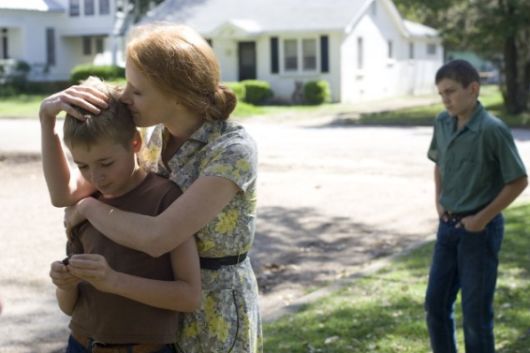
"Spellwork" - Austra (mp3)
"Darken Her Horse" - Austra (mp3)
"Lose It" - Austra (mp3)
